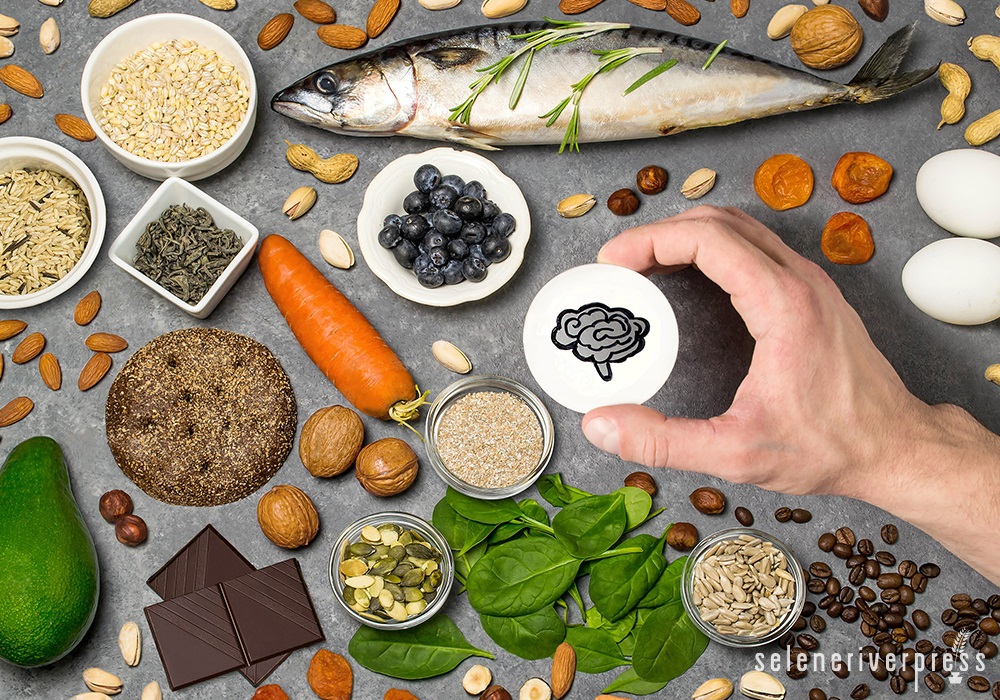With all of the discussion out there about how more and more of us are dealing with anxiety and depression, it’s hard not to wonder what other treatments we can turn to besides traditional pharmaceuticals and talk therapy. A question that’s been bouncing around in my head for a while now is: What role does nutrition play in our mental health?
I don’t mean to trivialize the experiences of those who struggle with this issue by saying it’s as easy as giving up this or that food and eating well. However, when I was working towards my bachelor’s degree in psychology, I don’t remember discussing nutrition in even one of my classes. And I’m sure we can all agree that how we nourish our bodies impacts how we move through each day in every way—physically, mentally, and emotionally. Right?
That’s why I was thrilled to discover the Center for Nutritional Psychology while doing some online self-health research. This is a field of psychology that examines how our diet affects our moods and behaviors and the relationship between nutrition and internal biophysical markers. It’s a fascinating branch of science that works toward bringing psychology and integrative medicine together.
There are two quotes on their website that give me hope for the direction this science is heading in:
“The principle philosophy of this movement is that each patient represents a unique, complex, and interwoven set of influences that affect the intrinsic functionality of that individual. Thus, each of these influences must be addressed to achieve wellness.”
“The field of nutritional psychology examines mental health in the context of nutritional needs/deficiencies and is an important piece of the puzzle when assessing a person as an integrated whole.”
Treating the whole person, eh? Brilliant! This specialization wasn’t even an option when I graduated in 1992. Does this reflect the impact that our dietary changes have made on our mental health? Or does it simply mark a greater awareness of how our daily choices affect our overall well-being? It’s hard to answer this with any real certainty, but I’m glad it’s gaining momentum now.
One of the principle beliefs of nutritional psychology is the idea that if the body is starved of nutrients, the brain suffers. Supporting this claim is the fact that brain inflammation is seen in many people dealing with mental health issues, which makes key nutrients such as healthy fats, B vitamins, and magnesium especially important in making sure the brain has what it needs. To drill down even further, this inflammation actually starts in the gut, so probiotics are crucial as well.
The thing is, all of us have our own unique nutritional deficiencies and needs in any given moment. That’s why it’s so important to work with a professional to help you decipher what your body and brain are crying out for.
Studies show magnesium is particularly important in the treatment of severe depression. For over a hundred years, psychiatric researchers have periodically rediscovered magnesium as the key nutrient of brain health and its usefulness in treating major depression. Furthermore, researchers have hypothesized that anti-depressive medications, in spite of all their negative side effects, elevate blood cell magnesium, which might be one of the reasons they can be effective.
The exciting news is that Standard Process is just about to launch their new magnesium product, E-Z Mg. This supplement is made from swiss chard and buckwheat leaf that’s grown on superbly rich, organic soils, and it contains over twenty organically bound forms of magnesium that can cross the blood-brain barrier, resulting in superior absorption and bioavailability. This food-based magnesium supplement delivers tons of vital nutrition to the brain, including fat-soluble chlorophyll complex, vitamin K and potassium, and naturally occurring nutrients from organically grown plants.
Explore the resources page put forth by the Center for Nutritional Psychology for book suggestions, articles, and a boatload of other self-health information about nutrition and mental health. They even provide links to various directories that can help you locate practitioners who follow an integrative approach to mind and body health.
It’s true that talk therapy and pharmaceuticals can play a critical role in helping those of us who need to get through some dark times. But we know that some people experience debilitating side effects from pharmaceuticals, so finding an alternative can be a blessing. I’m excited that some light is finally shining on the fact that nutrition is also an effective and beneficial treatment for the people who need it.
As I suspected, nutrition plays a powerful role in your mental health. Is there anyone in your life who would benefit from learning about nutritional psychology? Reach out to them. Now.
Images from iStock/13-Smile (main), KatarzynaBialasiewicz (post).



